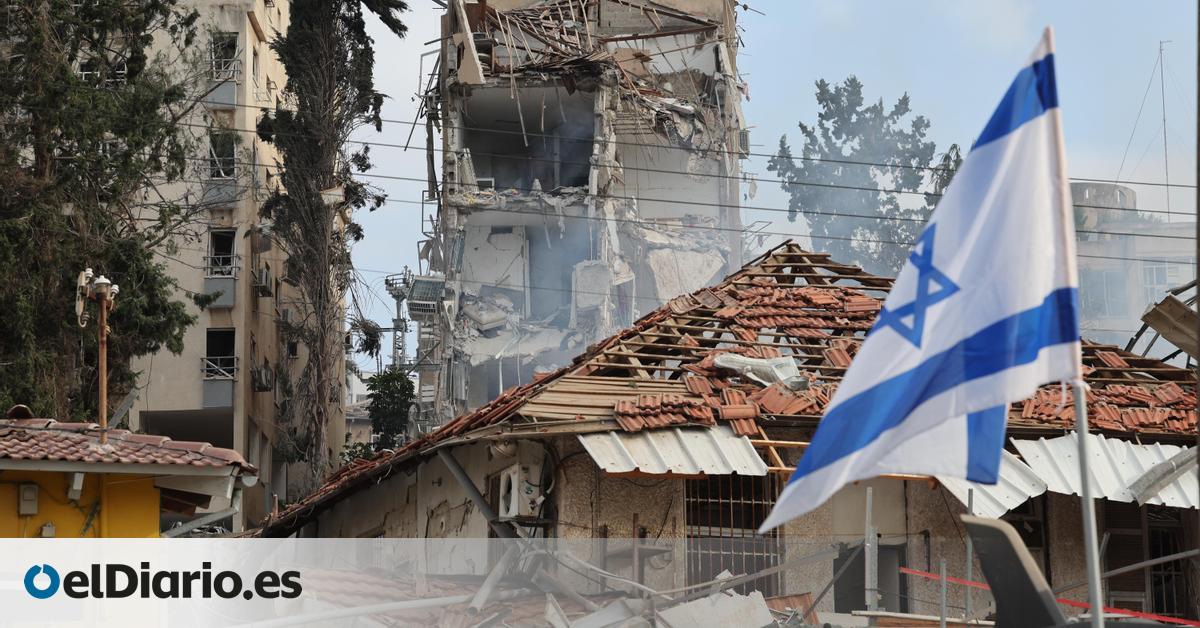
Iran launched two new massive attacks with ballistic missiles and drones on the north and center of Israel in response to the attacks of this Saturday of the Jewish state against the country’s energy infrastructure, including the largest plant of extraction and refinement of natural gas. Some of the missiles fired by the Iranian army have reached the cities of Haifa and Bat Yam. The attacks has left at least eleven dead, six missing and more than 180 injured, according to the Times of Israel newspaper.
Iran’s Air Force confirmed last night the launch of a “combined attack” against Israel that included both ballistic missiles and non -manned drones. The alarms in Israel sounded at 23.12 at night local time – the 22.12 in Spain – for the new Iranian attack, which is the fifth bombing of the Islamic Republic to Israeli cities and until now the one that has resulted in a greater number of deaths since last Thursday, when Israel began the offensive against the Persian state.
The impacts of the missiles in the coastal area of Haifa have caused four of the eleven deceased. These are four women residing in the Arab city of Tamra, in the outskirts of Haifa. Haifa is considered an important economic nucleus and has energy plants and an oil refinery, which has been the objective of the first of the attacks. In the city of Bat Yam the bodies of seven people have been recovered – including an 8 -year -old girl, a 10 boy and another boy of 18 -, according to Times of Israel.
The Foreign Minister, José Manuel Albares, indicated this Sunday morning that he has spoken with Iranian Foreign Minister and that Spain “works for containment and unwishly”: “Middle East needs peace and stability,” he said.
This Sunday, the US president, Donald Trump, has declared in a publication of his social network that Iran and Israel “should reach an agreement, and will reach an agreement,” after ensuring that it was he who managed to get India and Pakistan to reach an agreement, despite the fact that both countries have denied it from the beginning. Trump also says that he stopped the conflict between Serbia and Kosovo during his first term or that he intervened in the disputes between Egypt and Ethiopia through the Nile River dam and that “there is peace, at least for now, thanks to my intervention.” “In this way, we will have peace, soon, between Israel and Iran!”, Says the conservative leader, who recounts “many calls and meetings” and defends that “a long time” but “never get credit for anything.”
Israel requested the United States on Saturday to be incorporated into its war against Iran, according to US administration sources. In an interview with the ABC television networkTrump has left the door open to join the military conflict open by Israel: “We may be involved.” Also, the US president has said that he is open to the possibility that Vladimir Putin be part of a mediation effort in the conflict: “He is prepared. He called me about it. We had a long conversation about it.”
This Sunday, Foreign Minister Israleí, Gideon Sa’ar, said in an interview with the CNN that Israel’s goal “is not a regime change.” “The cabinet has decided the objectives, it was not one of the objectives,” said Sa’ar. In an almost simultaneous interview with the Fox News chain, Israeli Prime Minister Benjamín Netanyahu said this Sunday that they would “have had an atomic weapon in a matter of months if Israel had not attacked” and confirmed the murder of the highest ranking officer of the Iranian intelligence and his right hand in the last attacks on Tehran.
Netanyahu has confirmed that the US administration “knew the attacks ahead of time” and, although he has denied that one of Israel’s military objectives is the change of regime in Iran, has suggested that it can be one of the consequences of this war.
Israel asks Tehran residents to move away from electrical installations
The Army of Israel said in turn this Saturday night that they also launched an attack on military objectives in Tehran while working to intercept the Missile Wave launched by the Islamic Republic over its territory, according to a statement from the Israeli Armed Forces. “While the army operates to intercept the missiles launched from Iran, the air forces are attacking military objectives in Tehran,” they said.
This morning, Israel’s defense forces have asked the Iranian population to move away from any reactor or electrical installation. Shortly after the notice, Israel has attacked at least the facilities of the airport of the capital of Iran as well as a motor vehicle factory and another electronic component industry. Already in the afternoon, Israeli bombings have caused several columns of smoke after attacking, among other objectives, the headquarters of the Iran Navy as well as buildings of some ministries or the police headquarters.
Iran confirmed on Saturday an attack throughout the afternoon by Israel on Shahrán’s oil deposit, located northwest of Tehran. Some images published on social networks show what they seem like fuel deposits on flames around the Iranian capital. This Sunday, Iranian media have also confirmed attacks against the Ministry of Foreign Affairs as well as against the headquarters of Iranian intelligence, where both their leader and the attached officer would have died. Israeli Prime Minister Netanyahu has confirmed these two murders.
The Israeli defense minister, Israel Katz, had warned this Saturday the Supreme Leader of Iran, Ayatolá Ali Jamenei, that if the Iranian army continued to shoot missiles against Israeli territory, “Tehran will burn.” “The Iranian dictator is turning the citizens of Iran in Hostages and demonstrating that they, and in particular the residents of Tehran, will pay a high price for the criminal damage caused to the citizens of Israel. If Jamenei continues to shoot missiles against the Israeli internal front, Tehran will burn,” Katz has threatened in a statement. At the moment, the Israel authorities have extended the state of emergency in force since their first attacks against Iran until June 30 and have continued attacks on the capital and other parts of the country during Sunday.
In addition, according to the Israeli newspaper HaaretzBombarderos de Israel have made an attack on Yemen with the aim of murdering Mohamed Abdul Karim al-Ghamari, chief of the General Staff of the Armed Forces of the Hutis government, although without success, according to the Yemeni military bodies.
Iran responds to attacks on its energy infrastructure
In his attacks on Saturday, Israel has damaged energy objectives without relation to the Iranian nuclear industry, including a natural gas deposit in the Persian Gulf that will explode together with Qatar and on which there is one of the largest gas refineries in the Middle East, that of South Pars, which processes more than 125 million cubic meters of this fuel daily and whose production has had to stop. The Iranian agency Tasnim also reported another attack against the Fajr Jam refinery, also located in the Southern Bushehr province. Shortly after the attack, the Iranian Ministry of Petroleum said the fire was controlled.
In another of the Saturday afternoon bombings at least 31 people, 30 military troops and a red crescent member have died, and 55 more were injured in the Iranian province of Azerbaijan Eastern, as reported by the newspaper Tehran Times. According to CNN, the Iranian Ministry of Petroleum has confirmed two other attacks against oil refineries.
At dawn, one of these Israeli attacks has been directed against a residential building in Tehran, linked to the Iranian Ministry of Defense, causing at least 60 dead, 20 of them children, as reported by local television. At least one missile has impacted during the night against the Shahid Chamran floors complex, which has partially collapsed in the northeast of the capital. Iranian sources cited by Reuters claim that at least 14 nuclear scientists in the country have been killed since Thursday, in some cases through the use of bomb cars. Iranian media have also reported the simultaneous explosion of five pump vehicles this Sunday in Tehran.
This Sunday, among the victims of the last attacks of Israel, in addition to military, women and children are also appearing, such as the Mansoura Alikhani plastic artist after the bombings on residential areas. Israeli bombings have ended the lives of more than 128 people since Friday and leave more than 900 injured, According to sources from the Ministry of Health of Iran cited by the New York Times. Attacks on residential areas and civil or political buildings in broad daylight are already causing the exodus of many of Tehran’s inhabitants, in order to avoid personal damage.
Israel attacks against nuclear facilities
At the moment, the air attack made by Israel against the Fordow Uranium Enrichment Center, in the center-west of Iran, seems not to have left consideration damage nor is there a record of radioactive contaminationas the Organization for Atomic Energy, the Nuclear Agency of the Islamic Republic said Saturday. The organization’s spokesman, Behrouz Kamalvandi, explained to the semi -official agency ISNA that Israeli bombing has caused “limited damage.”
“Natanz’s damaged part is mostly on the surface,” explained the spokesman in response to an Israeli army statement that also announced damage to the Uranium centrifuger underground room. “In Natanz a small internal escape occurred but did not spread abroad, so there is no problem. The damage to Fordow has not been so serious,” said the spokesman.
An Israeli army spokesman has contradicted the Iranians to describe “significant damage” both in Natanz’s uranium enrichment plants and Ishafán. The International Atomic Energy Agency (OIEA) has confirmed this Saturday that the Isfahán nuclear plant suffered damage to Israeli bombings and that one of the affected infrastructure is that of uranium processing.
The UN agency led by the Italian Raffele Grossi said that, according to the information available, four important buildings in Isfahán were damaged in yesterday’s attacks, including the plant where the uranium mineral is transformed into the gas that is then enriched to make nuclear fuel. Israel’s bombings also damaged a fuel manufacturing plant located in the Isfahán complex.
As in Natanz, the installation where the gas is centrifugal to obtain enriched uranium, the OIEA maintains that an increase in radioactivity abroad is not expected in Isfahán, according to a message uploaded to the social network X. In Natanz there is a record of chemical and radiological contamination, according to Grossi himself on Friday night during the extraordinary meeting of the United Nations Security Council.
This Sunday, several expert analysts in the country as well as in the region, have indicated the possibility that attacks against Iran nuclear facilities can cause an exit of the country from the non -proliferation treaty. This possibility has been open after the spokesman for the National Security Commission of the Iranian Parliament said this morning, cited by the Farsi news agency, which “is now the best time to retire” from the treaty. “The TNP was supposed to guarantee our security, and not that it would become a cause of insecurity,” he added.
Source: www.eldiario.es

